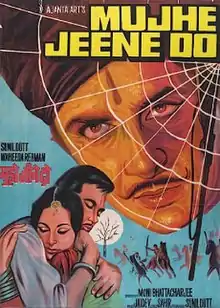Mujhe Jeene Do (1963 film)
Mujhe Jeene Do (transl. Let Me Live) is a 1963 Hindi film, directed by Moni Bhattacharjee and written by Aghajani Kashmeri. This dacoit drama stars Sunil Dutt, Waheeda Rehman, Nirupa Roy, Rajendranath and Mumtaz.
| Mujhe Jeene Do | |
|---|---|
 Poster | |
| Directed by | Moni Bhattacharjee |
| Produced by | Sunil Dutt |
| Written by | Mursid alom[1] |
| Starring | Sunil Dutt Waheeda Rehman |
| Music by | Jaidev (Music) Sahir Ludhianvi (Lyrics) |
Production company | Ajanta Arts |
Release date |
|
Running time | 180 minutes |
| Country | India |
| Language | Hindustani[2] |
Shot in the Chambal Valley ravines of Bhind-Morena under police protection in Madhya Pradesh state,[3] and Mohan Studios, Mumbai[4] the film highlights the acting talents of its star cast; Waheeda Rehman and Sunil Dutt,[5] and indeed the music by musical genius Jaidev. It was the fourth highest grossing Bollywood film of the year,[6] and the official selection at the 1964 Cannes Film Festival.[7] The film was also the second success in a row of actor Sunil Dutt's production banner, Ajanta Arts, after Yeh Rastey Hain Pyar Ke, which had been released earlier that year. Mujhe Jeene Do was India's third "dacoit" film, a genre loosely inspired by Hollywood westerns, but more so by the menace of dacoity in Central India in the early 1960s. The film was a major success, like the earlier two other big films in the same genre, Ganga Jamuna (1961) and Raj Kapoor's Jis Desh Mein Ganga Behti Hai (1960).[8]
Overview
Dacoits were traditionally shown as a rogue or menace to the society, especially in Hindi cinema, here for the first time film director, tried to show them in a fresh humanist perspective, thereby giving the film its memorability.
The film's humanist angle is credited to its director Moni Bhattacharjee, who earlier assisted realist cinema master Bimal Roy in Do Bigha Zamin (1953) and Madhumati (1958), before turning director himself.[9]
The film was film actor Sunil Dutt's second film as a film producer, after Yeh Rastey Hain Pyar Ke (1963),[10] through which he yet again tried to break away from the traditional romantic leads he was offered in the mainstream Hindi cinema. Though, here again, his role turned out to be that of romantic dacoit, though his acting received wide acclaim, and even Filmfare Best Actor Award of 1965.
Both Mujhe Jeene Do and Yeh Raaste Hain Pyaar Ke were written by Sunil's best friend and favourite screenwriter, Aghajani Kashmeri.
Synopsis
Mujhe Jeene Do, is a classic dacoit drama from the western films genre,[11] a story about how love can lead to the redemption of even a hardened criminal[12] like Thakhur Jernail Singh (Sunil Dutt), who is a noted dacoit in Chambal Valley.
One night, he happens to meet Chameli (Waheeda Rehman) a courtesan, at a wedding she was performing at. They elope and fall in love, later they have a son. But their romance is short-lived as he is about to be captured by the police, that is when Jernail sends Chameli away to a neighbouring village to raise their son, as he is sure of his end.
Unfortunately, the village she goes to has an old grudge with the Jamila to settle and attacks the hapless mother and son as a mob, but the police save them in time, and even promises them the seized property of Jernail.
Cast
- Sunil Dutt as Thakur Jarnail Singh
- Waheeda Rehman as Chameli Jaan
- Nirupa Roy as Champa
- Durga Khote as Dara Khan's Mom
- Rajendra Nath as Dara Khan
- Manorama as Chamelijaan's Mom
- Siddhu as Thakur Kirpal Singh
- Anwar Hussain as Phool Singh
- Tarun Bose as Superintendent of Police
- Kumari Naaz as Chauthi Begum (as Naaz)
- D.K. Sapru as Zamindar
- Mumtaz as Farida - Dhara's Sister
- Wasi Khan
- Mohan Choti as Kripal Singh's Goon
- Madhumati as item number
- Cuckoo as item number
- Krishan Dhawan as School-teacher
- Asit Sen as Pandit Ram Avtar
- Rashid Khan as Maulana Sheikh Rahim
- Dulari as Phool Singh's Wife
Soundtrack
The music of Jaidev, coupled with lyrics by Sahir Ludhianvi, add to the tragic nature of the film. Also standing out is the cheerful song Nadi Naare sung by Asha Bhosle, noted for perfect rendition of the high-pitched song.[13]
| # | Title | Singer(s) |
|---|---|---|
| 1 | "Nadi Naare Na Jao Shyam Pai Padoon" | Asha Bhosle |
| 2 | "Ab Koi Gulshan Na Ujde" | Mohammed Rafi |
| 3 | "Tere Bachpan Ko Jawani Ki Dua" | Lata Mangeshkar |
| 4 | "Mohe Na Yoon Ghoor Ghoor Ke Dekho" | Lata Mangeshkar |
| 5 | "Raat Bhi Hai Kuch Bheegi Bheegi" | Lata Mangeshkar |
| 6 | "Moko Peehar Mein Mat Chhed" | Asha Bhosle |
| 7 | "Maang Mein Bhar Le Rang Sakhi Re" | Asha Bhosle |
Awards
- 1964 Filmfare Best Actor Award: Sunil Dutt - Won
- 1964 Cannes Film Festival: Official selection, in competition for awards[14]
References
- Other Crew
- Gahlot, Deepa (2015). Take-2: 50 Films That Deserve a New Audience. Hay House. p. 245. ISBN 9789384544850.
- "Mujhe Jeene Do (1963)". The Hindu. 13 May 2010.
- Film locations IMDb.
- Film Review Channel 4
- Box Office India. "Top Earners 1963". boxofficeindia.com. Archived from the original on 14 October 2013.
- Official Selection 1964 Cannes Film Festival
- "The real life hero". Screen. 6 June 2008. Archived from the original on 3 March 2010.
- Moni Bhattacharjee at IMDb
- Sunil Dutt Upperstall.com
- Overview- Review New York Times
- Review at mouthshut
- Ranade, Ashok Da. (2006). Hindi Film Song: Music Beyond Boundaries. Bibliophile South Asia. p. 367. ISBN 81-85002-64-9.
- "Festival de Cannes: Mujhe Jeene Do". festival-cannes.com. Retrieved 28 February 2009.